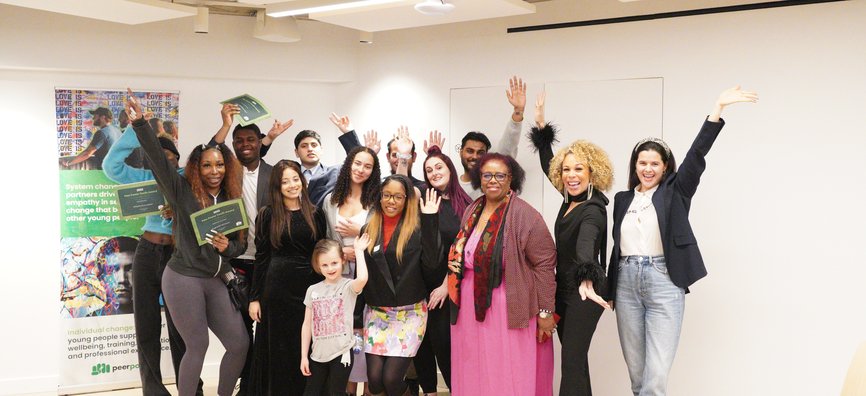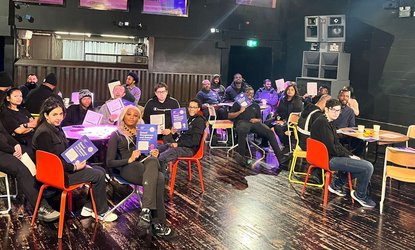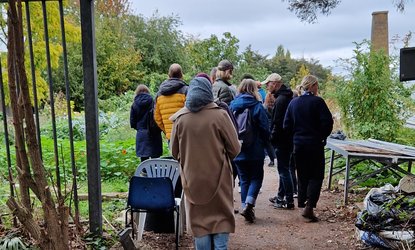Together with Peer Power Youth and Place Matters, we're pleased to share a report, Supporting Employees with Lived Experience, with learning from 24 social impact organisations as part of a peer learning exchange on lived experience. Esmée Funding Manager, Genevieve Ford-Saville, writes about how the group came about and what's next for this work.
In our work as a funder, we often talk about the value of lived experience - how it can challenge norms, transform services, and accelerate change. But how much do we truly understand and meaningfully support the people who are brave enough to work in a job where they have 'skin in the game'? People who bring the insights and the weight of personal connection to the work of social justice are invaluable and if we want to sustain them we need to understand, and care deeply about, what keeps them safe and well, and serves them best.
In 2023, our grant partner Peer Power Youth approached us with a challenge. Anne-Marie Douglas, Peer Power Youth's CEO, was concerned that, primarily due to resource constraints and traditional 'one-size fits all' HR policies, their organisation was struggling to offer the ethically responsive and trauma informed support that lived experience staff need to thrive. Anne-Marie wanted to share their learning and insights around genuinely supporting lived experience with, and to learn from, other organisations working through similar issues.
To help, we offered Funding Plus support to explore what needs to change. This led to the launch of a new peer learning group in November 2023. A dedicated convening, bringing together 24 senior leaders of organisations who employ a significant proportion of staff with lived experience. The peer learning group met every two months between November 2023 and May 2024. The sessions were co-designed and facilitated by Peer Power Youth and Place Matters, organisations rooted in trauma-informed, equity-driven approaches. Together the group created a safe space to share, listen, reflect, and learn together.
You can read or download the report of their learning journey below. A web version of the report that's screen reader friendly is here.
By sharing the report, we hope it will encourage funders and organisations alike to rethink what meaningful support looks like, and how we can help lived experience not just survive - but thrive - in our sector.
A shared challenge, a shared commitment
The organisations that took part in the peer learning group came from across the UK and spanned a wide range of focus areas - from disability and mental health, to racial justice, LGBTQ+ rights, refugee support, and gender justice. A common thread ran through every conversation: supporting staff with lived experience is a must, and, it comes with manifold underacknowledged challenges.
Staff with lived experience often bring profound insight, empathy, and authenticity to their roles. But when work intersects with personal histories of trauma, discrimination or exclusion, it can also be emotionally taxing and, in some cases, re-traumatising. Smaller organisations, often with limited capacity and precarious core funding, are frequently left to navigate these dynamics without adequate support structures and resources.
The peer learning group identified some specific themes to be addressed, to improve wellbeing, safety and sustainability for lived experience staff:
- The recruitment and induction journey for lived experience staff
- Supporting staff wellbeing in trauma-responsive ways
- Creating peer support within and across teams
- Building HR policies that are inclusive and accessible
- Developing leadership pathways and succession planning for staff with lived experience
You can read more about these themes in the report.
Sharing learning with funders
In September 2024, we convened a face-to-face meeting for the peer learning group and funders to talk about the themes. The event was designed to open up dialogue: not just about the challenges, but about what we, as funders, can do differently.
The conversations were powerful. Funders acknowledged the need for more nuanced, flexible funding models - ones that account for wellbeing, trauma recovery, and organisational development as essential costs, not optional extras. Charities shared examples of what helps: from wellbeing funds and flexible sick pay, to accessible recruitment processes and co-designed HR policies.
The peer group developed a resource mapping out an “ideal employee life cycle” for staff with lived experience. It includes practical ideas for each stage of employment, from job descriptions and interviews to onboarding, development, and moving on.
What next and how to get involved
We were especially struck by the appetite for collaboration coming from the convening. As one participant put it: "I found the support, solidarity and shared understanding across sectors facing similar challenges and experiences the most valuable". Based on this we’re exploring launching a community of practice co-designed with the peer learning group, for those who are interested in taking this learning forward together.
If you'd like to get involved, hear about future convenings, and keep up to date with this learning journey, or if you’re a funder and want to be part of that conversation, we’d love to hear from you. Please get in touch by sending an email to: communications@esmeefairbairn.org.uk.
Thank you to every organisation and leader who took part in the peer learning group, to our partners Peer Power Youth and Place Matters for leading the journey, and to Lizzies Lines who so beautifully captured the learning in the report. We’re proud to share this report as a reflection of the peer learning group's wisdom and generosity, and we hope it will be a much used resource for the wider sector.






